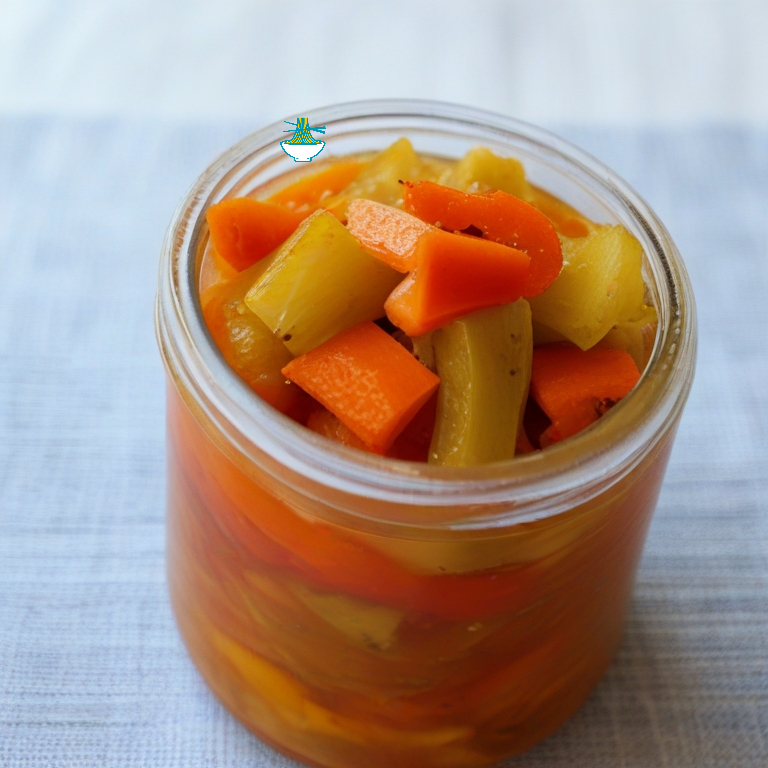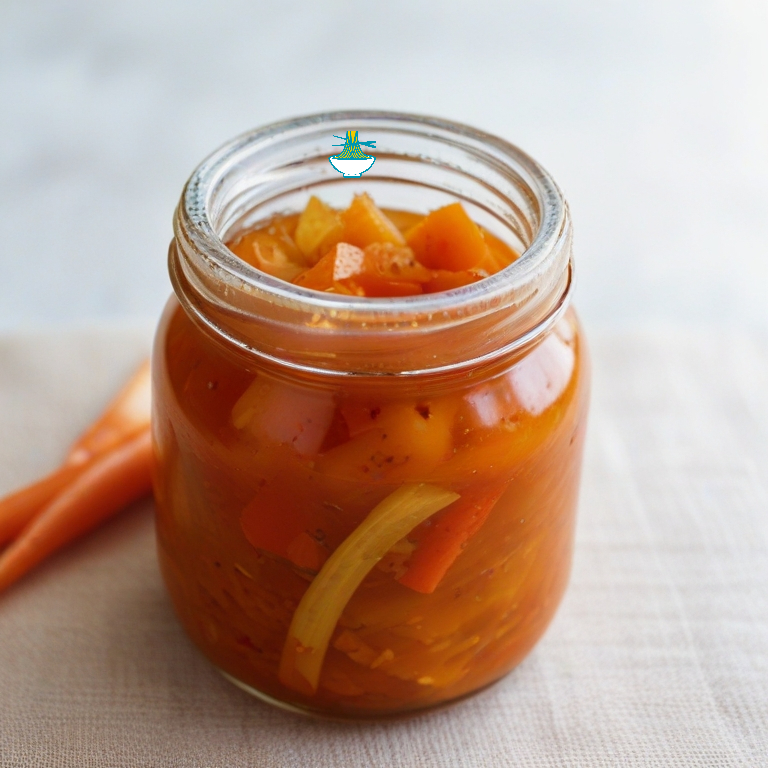Embark on a culinary adventure through the vibrant streets of Haiti with Pikliz, a beloved and fiery condiment that embodies the essence of Haitian cuisine.  Our journey takes us to the heart of Haitian culture, where Pikliz reigns supreme as a staple on dining tables and street food stalls alike. Bursting with tangy flavors and a kick of heat, Pikliz is a unique blend of pickled vegetables, scotch bonnet peppers, and aromatic spices, creating a taste sensation that is as bold as the spirit of Haiti itself. Join us as we delve into the history, preparation, and diverse uses of Pikliz, discovering its role in enhancing dishes ranging from griot (fried pork) to accra (spiced fritters). Whether you're a seasoned traveler or an adventurous foodie, let Pikliz guide your palate on a journey through the rich and flavorful tapestry of Haitian cuisine.
Our journey takes us to the heart of Haitian culture, where Pikliz reigns supreme as a staple on dining tables and street food stalls alike. Bursting with tangy flavors and a kick of heat, Pikliz is a unique blend of pickled vegetables, scotch bonnet peppers, and aromatic spices, creating a taste sensation that is as bold as the spirit of Haiti itself. Join us as we delve into the history, preparation, and diverse uses of Pikliz, discovering its role in enhancing dishes ranging from griot (fried pork) to accra (spiced fritters). Whether you're a seasoned traveler or an adventurous foodie, let Pikliz guide your palate on a journey through the rich and flavorful tapestry of Haitian cuisine.
Ingredients:
- 1 small cabbage, shredded
- 2 carrots, grated
- 1 large onion, thinly sliced
- 2 Scotch bonnet peppers, thinly sliced (adjust quantity based on desired heat level)
- 1 bell pepper, thinly sliced
- 1 cup white vinegar
- 1/4 cup lime juice
- 2 tablespoons sugar
- 1 tablespoon salt
- 1 teaspoon black peppercorns
- 1 teaspoon mustard seeds
- 2 cloves garlic, minced
- 1 teaspoon grated ginger (optional)
- 1/2 teaspoon turmeric (optional)
Instructions:
1- In a large mixing bowl, combine the shredded cabbage, grated carrots, sliced onion, sliced Scotch bonnet peppers, and sliced bell pepper. Toss the vegetables together until evenly mixed.
2- In a saucepan, combine the white vinegar, lime juice, sugar, salt, black peppercorns, mustard seeds, minced garlic, grated ginger (if using), and turmeric (if using). Bring the mixture to a gentle boil over medium heat, stirring occasionally until the sugar and salt are completely dissolved. Remove from heat and let it cool slightly.
3- Pour the warm vinegar mixture over the mixed vegetables in the bowl. Use a spoon or tongs to toss the vegetables until they are well coated with the liquid.
4- Transfer the pikliz mixture into a clean, sterilized jar with a tight-fitting lid. Press down on the vegetables to ensure they are submerged in the liquid.
5- Seal the jar tightly and let it cool to room temperature. Once cooled, refrigerate the pikliz for at least 24 hours to allow the flavors to develop. It will keep in the refrigerator for several weeks.
6- Serve pikliz as a spicy and tangy accompaniment to your favorite Haitian dishes, such as griot (fried pork), tasso (fried goat), or accra (spiced fritters). Enjoy the vibrant flavors of Haiti with this zesty pickled vegetable relish!
Nutritional Values:
Here are the approximate nutritional values for the ingredients used in the Haitian Pikliz recipe:
Small cabbage (1 head, shredded):
- Calories: 227
- Carbohydrates: 53g
- Fiber: 20g
- Protein: 10g
- Fat: 1g
benefits:Rich in vitamins K and C, as well as fiber, cabbage supports digestion and immune function.
Carrots (2 medium):
- Calories: 52
- Carbohydrates: 12g
- Fiber: 4g
- Protein: 1g
- Fat: 0g
benefits:High in beta-carotene, fiber, and antioxidants, carrots promote eye health and may reduce the risk of certain chronic diseases.
Onion (1 large):
- Calories: 60
- Carbohydrates: 14g
- Fiber: 3g
- Protein: 2g
- Fat: 0g
benefits:Onions contain antioxidants and compounds that may help reduce inflammation and improve heart health.
Scotch bonnet peppers (2 medium):
- Calories: 18
- Carbohydrates: 4g
- Fiber: 1g
- Protein: 1g
- Fat: 0g
benefits:Packed with capsaicin, scotch bonnet peppers have anti-inflammatory properties and may boost metabolism.
Bell pepper (1 large):
- Calories: 46
- Carbohydrates: 11g
- Fiber: 4g
- Protein: 2g
- Fat: 0g
benefits:Bell peppers are an excellent source of vitamin C, vitamin A, and antioxidants, supporting immune function and skin health.
White vinegar (1 cup):
- Calories: 48
- Carbohydrates: 0.9g
- Fiber: 0g
- Protein: 0g
- Fat: 0g
benefits:Vinegar may help regulate blood sugar levels, aid digestion, and promote satiety.
Lime juice (1/4 cup):
- Calories: 8
- Carbohydrates: 2.6g
- Fiber: 0.2g
- Protein: 0.2g
- Fat: 0g
benefits:Lime juice is rich in vitamin C and antioxidants, supporting immune function and skin health.
Sugar (2 tablespoons):
- Calories: 96
- Carbohydrates: 25g
- Fiber: 0g
- Protein: 0g
- Fat: 0g
benefits:While sugar adds sweetness to the pikliz, it should be consumed in moderation due to its high calorie content.
Salt (1 tablespoon):
- Calories: 0
- Carbohydrates: 0g
- Fiber: 0g
- Protein: 0g
- Fat: 0g
benefits:Salt enhances flavor and helps preserve the pikliz, but should be consumed in moderation to maintain healthy blood pressure levels.
Black peppercorns (1 teaspoon):
- Calories: 6
- Carbohydrates: 1.4g
- Fiber: 0.6g
- Protein: 0.3g
- Fat: 0.1g
benefits:Black pepper contains piperine, which may enhance nutrient absorption and has antioxidant properties.
Mustard seeds (1 teaspoon):
- Calories: 7
- Carbohydrates: 0.6g
- Fiber: 0.4g
- Protein: 0.3g
- Fat: 0.5g
benefits:Mustard seeds are rich in antioxidants and may have anti-inflammatory and digestive benefits.
Garlic (2 cloves):
- Calories: 9
- Carbohydrates: 2g
- Fiber: 0.1g
- Protein: 0.4g
- Fat: 0g
benefits:Garlic contains allicin, a compound with various health benefits, including potential immune-boosting and heart-protective effects.
Ginger (1 teaspoon):
- Calories: 2
- Carbohydrates: 0.5g
- Fiber: 0.1g
- Protein: 0.1g
- Fat: 0g
benefits:Ginger has anti-inflammatory and digestive properties and may help alleviate nausea and reduce muscle pain.
Turmeric (1/2 teaspoon):
- Calories: 3
- Carbohydrates: 0.6g
- Fiber: 0.2g
- Protein: 0.1g
- Fat: 0g
benefits:Turmeric contains curcumin, a compound with powerful anti-inflammatory and antioxidant properties, potentially benefiting heart and brain health.
Keep in mind that these values are approximate and may vary slightly based on factors such as the specific variety of ingredients and the method of preparation. Additionally, the nutritional values for the finished pikliz will depend on the amount consumed and the serving size.


Comments